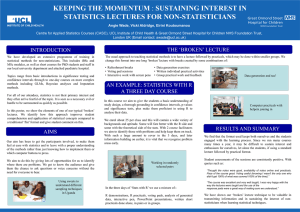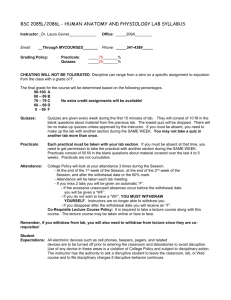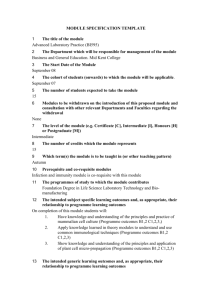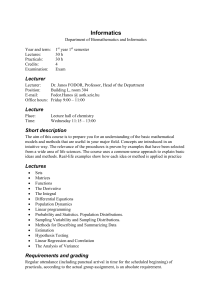Course Syllabus - University of Toronto
advertisement
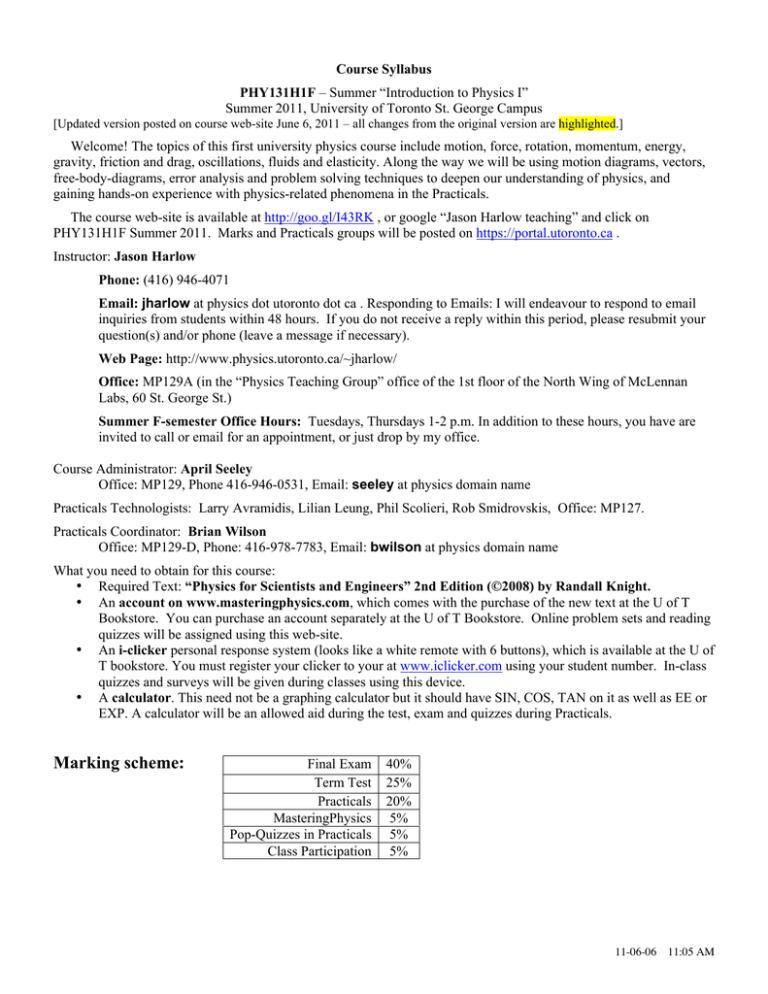
Course Syllabus PHY131H1F – Summer “Introduction to Physics I” Summer 2011, University of Toronto St. George Campus [Updated version posted on course web-site June 6, 2011 – all changes from the original version are highlighted.] Welcome! The topics of this first university physics course include motion, force, rotation, momentum, energy, gravity, friction and drag, oscillations, fluids and elasticity. Along the way we will be using motion diagrams, vectors, free-body-diagrams, error analysis and problem solving techniques to deepen our understanding of physics, and gaining hands-on experience with physics-related phenomena in the Practicals. The course web-site is available at http://goo.gl/I43RK , or google “Jason Harlow teaching” and click on PHY131H1F Summer 2011. Marks and Practicals groups will be posted on https://portal.utoronto.ca . Instructor: Jason Harlow Phone: (416) 946-4071 Email: jharlow at physics dot utoronto dot ca . Responding to Emails: I will endeavour to respond to email inquiries from students within 48 hours. If you do not receive a reply within this period, please resubmit your question(s) and/or phone (leave a message if necessary). Web Page: http://www.physics.utoronto.ca/~jharlow/ Office: MP129A (in the “Physics Teaching Group” office of the 1st floor of the North Wing of McLennan Labs, 60 St. George St.) Summer F-semester Office Hours: Tuesdays, Thursdays 1-2 p.m. In addition to these hours, you have are invited to call or email for an appointment, or just drop by my office. Course Administrator: April Seeley Office: MP129, Phone 416-946-0531, Email: seeley at physics domain name Practicals Technologists: Larry Avramidis, Lilian Leung, Phil Scolieri, Rob Smidrovskis, Office: MP127. Practicals Coordinator: Brian Wilson Office: MP129-D, Phone: 416-978-7783, Email: bwilson at physics domain name What you need to obtain for this course: • Required Text: “Physics for Scientists and Engineers” 2nd Edition (©2008) by Randall Knight. • An account on www.masteringphysics.com, which comes with the purchase of the new text at the U of T Bookstore. You can purchase an account separately at the U of T Bookstore. Online problem sets and reading quizzes will be assigned using this web-site. • An i-clicker personal response system (looks like a white remote with 6 buttons), which is available at the U of T bookstore. You must register your clicker to your at www.iclicker.com using your student number. In-class quizzes and surveys will be given during classes using this device. • A calculator. This need not be a graphing calculator but it should have SIN, COS, TAN on it as well as EE or EXP. A calculator will be an allowed aid during the test, exam and quizzes during Practicals. Marking scheme: Final Exam Term Test Practicals MasteringPhysics Pop-Quizzes in Practicals Class Participation 40% 25% 20% 5% 5% 5% 11-06-06 11:05 AM PHY131H1F Syllabus Summer 2011 - Page 2 of 5 Class Reading Schedule (please read these chapters before coming to class!) 1. 2. 3. 4. 5. 6. 7. 8. 9. 10. 11. 12. Tue, May 17: Ch. 1, Course Syllabus Thu, May 19: Error Analysis Document “Mini-Version”, Ch. 2 Tue, May 24: Ch. 3 plus Ch. 4: sections 4.1 through 4.4 Thu, May 26: Ch. 4: sections 4.5 through 4.7 plus Ch. 5 Tue, May 31: Ch. 6 Thu, June 2: TERM TEST on Chs.1-6 + Error Analysis Document, in EX100 6:10-8:00pm Tue, June 7: Chs. 7 and 8 Thu, June 9: Ch. 9 plus Ch. 10: sections 10.1 through 10.5 Tue, June 14: Ch.10: sections 10.6 and 10.7 plus Ch. 11 Thu, June 16: Ch. 12 Tue, June 21: Ch. 14 [note we skip Ch.13 for this course] Thu, June 23: Ch. 15: sections 15.1 through 15.4 [note we skip sections 15.5 and 15.6 for this course] Term Test and Final Exam A 110 minute Term Test will be held in EX100 on Thursday, June 2 from 6:10pm to 8:00pm. A 3-hour final examination, will be held in EX200 on Tuesday, June 28 from 6:00pm to 9:00pm. Both the test and exam will involve a combination of multiple choice and written questions, which test your understanding of course material and ability to think and apply what you have learned to simple problems. A pocket calculator with no communication ability and a 8.5"×11" double-sided piece of paper with your own hand-written notes will be permitted during the test. Two pieces of paper are allowed aids on the exam. Practicals In addition to classes, you will be meeting in Practicals for 2 hours every Tuesday and Thursday in room MP125 (A, B, or C). Each Group will have a maximum of 36 students. You will be working in a Team with up to three of your classmates. There will be two Teaching Assistant Instructors present for each Practical, who will also be available for office hours throughout the semester to help you. The detailed schedule with the write-ups for all of the activities is posted on the course web-site. Please download the write-ups and have a look at them before each practical. You do not need any special equipment or clothing for Practicals, just a calculator, something to write with, and enthusiasm! Here is the basic Practicals schedule: 1. Thu, May 19: Ch. 1 2. Tue, May 24: Ch. 2, Error Analysis 3. Thu, May 26: Chs. 3 and 4 4. Tue, May 31: Ch. 5 No Practicals on Test Day 5. Tue, June 7: Ch. 6 6. Thu, June 9: Scrambling Teams, Teamwork, Chs. 7 and 8 7. Tue, June 14: Chs. 9 and 10 8. Thu, June 16: Ch. 11 9. Tue, June 21: Ch. 12 10. Thu, June 23: Ch. 14 Seating in the Practicals is assigned by your TAs: a list posted on the first day will tell you which table you have been assigned to. The seating assignments will be scrambled half-way through the semester. Your Team of 2 to 4 students will keep a single lab book (provided by us), which is to be a complete record of everything you did, what you and your teammates thought it meant, and what conclusions you have drawn from your work. Each Practical session will include time for student questions and discussion. However, the “heart” of the Practicals will be a series of activities based on the material most recently discussed in class. For each Practical session two members of each Team will serve the following roles: (1) Facilitator: This person, a different individual each week, is responsible for keeping the Team on track with the Activities. When the entire PHY131H1F Syllabus Summer 2011 - Page 3 of 5 Practical group discusses some topic, the Facilitator will be the Team’s primary spokesperson. (2) Recorder: This person, also a different individual each week, takes primary responsibility for recording all work, speculations, conclusions etc. in the lab notebook. The Practicals will count for 20% of your mark in PHY131. A random selection of activities spread over the semester will be marked by one of your TAs. All team members who share a notebook, and are present, will share the mark for each activity. Each activity that is marked will be marked on integer scale from 0 to 4: 0 means “Missing work or student was absent”, 1 means “Seriously deficient”, 2 means “Requires improvement”, 3 means “Good work”, 4 means “Exceptional”. Here are the components and their weights: • Notebook Mark 1 (worth 0 % of course): After the first Practical the lab books will be collected and marked. However, this mark will not count towards your Practical mark. Instead it is intended to make our standards and requirements clear to you. • Notebook Mark 2 (worth 7.5 % of course): After the 5th Practical session, a selection of Activities from sessions 2 through 5 will be chosen to be marked. The decision of which Activities will be marked will be chosen randomly after the books have been collected. All Teams will have the same Activities marked. • Notebook Mark 3 (worth 7.5% of course): At the end of the term a selection of Activities from sessions 6 through 10 will be chosen to be marked. The decision of which Activities will be marked will be chosen randomly after the books have been collected. All Teams will have the same Activities marked. • Individual Assessment (worth 5% of course): Throughout the semester your two TAs will be observing how you, as an individual, perform in the Practicals on an ongoing basis. In arriving at this mark, your TAs will take into account your preparedness, the way you approach and organize experimentation and record-keeping, and your ability to work effectively with your team members. Also considered will be your ability to estimate errors (rather than calculating each one exactly), your ability to distinguish the essential from the inessential, your willingness to try something, to make a mistake, and to learn from it, and how often you seek advice and ask questions. If an individual is often late or absent this may also affect the Individual Assessment mark. At the end of the course, the in-lab mark will first be computed on the integer 4-point scale by both of your TAs independently. Then, in consultation with the Practicals coordinator, half-integer marks will be allowed as the results from both TAs are combined into a single mark for each student. Therefore, the Individual Assessment mark can have a value of 0, 0.5, 1, 1.5, 2, 2.5, 3, 3.5 or 4. “Cube of Absences Rule”: Attendance at the Practical is vital for your learning, and it is mandatory. If you do not attend, you will be letting down your teammates. The Practicals mark (worth 20% of the course mark) will be converted to a mark out of 100. The number of absences each student has will be cubed and deducted from this total out of 100. Effectively, this means that one absence generates a 1% penalty in Practicals mark (0.2% of the course). Two absences generates an 8% penalty (1.6% of the course). Three absences generates a 27% penalty, etc. Five absences means that a student will get a zero for the Practicals component, meaning 20% of the course mark is lost. If a student arrives more than 20 minutes late or leaves more than 10 minutes early, he or she receives the “cube of absence rule” penalty for that day. However, the late or early-leaving student can still receive marks for all the activities he or she actually performs with his or her team. “If You Have Time Activities (IYHT)”: IYHT Activities should not be attempted by any teams until they have spoken to a TA and obtained permission. For each of Notebook Marks 2 and 3, one IYHT activity will be randomly selected along with the regular activities. Teams that did well on the chosen IYHT get a 0.5-point bonus, while teams that didn't do it or tried but didn't do well on it get no bonus points. MasteringPhysics Online Homework There are two types of online homework assignments you must complete on the MasteringPhysics web site: Reading Quizzes and Problem Sets. Reading Quizzes are sets of 5 or 6 quick, straightforward multiple-choice questions based on the reading you are supposed to do before each class. These quizzes are due on Tuesdays and Thursdays at 6:00pm; the first one is due PHY131H1F Syllabus Summer 2011 - Page 4 of 5 Thursday May 19. If you have done the assigned reading, it should take less than 10 minutes to complete each quiz. You will receive no credit for late submissions. You are only allowed one attempt at each question. The correct answers will be available for review after the quiz is due. Problem Sets are composed of test-style problems based on the material you have recently covered in class. They are due on Mondays and Wednesdays at 11:59pm; the first one is due Monday May 23. Problem set questions are similar to test and exam questions in style, length and difficulty level. Working through the problem set questions is an excellent way to study and prepare for your tests and exam. I recommend you use scrap paper and a pen to work through the problems “offline”, similar to how you would work on them for a test or exam. Each problem set is meant to take between 1 and 3 hours depending on your proficiency with the material. You are allowed up to 4 attempts at answering each problem. If you obtain the correct answer by the 4th try, it is worth full points. The correct answer is revealed once you exhaust all attempts or give up on any part. Hints are helpful clues or simpler questions that guide you to the answer. There is no penalty for opening hints and no benefit to not opening hints, however, these hints will not be available for the tests or exam, so try not to rely on them too much! Late problem sets are penalized at the rate of 10% for each hour late, and this penalty is applied to the whole problem set even if some parts are finished on time. In order to begin your MasteringPhysics work: • Go to http://www.masteringphysics.com/ • Click on Register Students. • You will be asked for an Access Code, which came with your new textbook purchase, or can be purchased separately from the U of T bookstore. • You will be asked for your name. Use the exact same name that you gave on ROSI. • You will be asked for a Student ID. This should be your 9-digit student number. You cannot change this later, so be sure to type it carefully. • You will choose a login and password. This should remain valid for one calendar year. • You will be asked for the course ID: it is PHY131SUMMER11 • Click on Assignment List in the upper-left corner of the screen to see the available assignments. Pop-Quizzes Several times through the semester, during Practicals, your TAs will give you a 10 minute quiz based directly on one of the problems that was due on the MasteringPhysics Problem Set from the previous evening. The timing of these quizzes, and which questions they are based on will be random. Students will be spread out in the room and must work individually on these quizzes. Calculators and your textbook are allowed aids, but use of the internet is not allowed and you may not communicate with other students during the quiz. Your TAs will mark each quiz out of 10 and return it to you during the next Practical session. Class Participation Every class I will be giving informal in-class activities and i-clicker questions. Good participation in the written activities will count for 10 points; this mark is based on effort, not accuracy. Use of clickers will count for 1 participation point per question answered, and 1 additional accuracy point for each question answered correctly. (For example, if you do the written activity, and I ask 5 questions and you get 3 of them correct, but don’t bother to vote in the last one, you would get 10 + 4 + 3 = 17 points for that class, and the maximum is 20, so you get 85%.) You must do your reading before coming to class in order to get the most out of these questions! The maximum number of points is the sum of the maxima from 11 classes throughout the semester. There are no clicker questions during the first class. If your Final Exam percentage mark is higher than your total Class Participation mark, your final exam mark will replace your Class Participation mark. This would effectively make the final exam worth 45% of your course mark, and Class Participation worth 0% accordingly. Note there are no make-up activities or clicker questions, and medical absences are not granted for Class Participation. In order to register your clicker: • Go to http://www.iclicker.com/ • Click on Register Your i>clicker. • You will be asked for an Access Code, which came with your new textbook purchase, or can be purchased separately from the U of T bookstore. PHY131H1F Syllabus Summer 2011 - Page 5 of 5 • • • You will be asked for your name. Use the exact same name that you gave on ROSI. You will be asked for a Student ID. This should be your 9-digit student number. You will be asked for your Remote ID. This is a series of 8 numbers and letters on the white sticker on the bottom of the back of your clicker, just below the i>clicker INSTRUCTIONS. Discussions with others in groups of 2 or 3 is encouraged during all of these in-class questions, but you must be in attendance, submit your own activity sheet, and have your own clicker in order to obtain points. If a student is caught with more than one remote, for example, the registered owners of both clickers will be considered to have committed an academic offense. The minimum penalty for having committed such an academic offense is a zero for the class participation for the entire course which will not be replaced with the final exam mark. See http://www.utoronto.ca/academicintegrity/ for more information on Academic Integrity issues at the University of Toronto.
